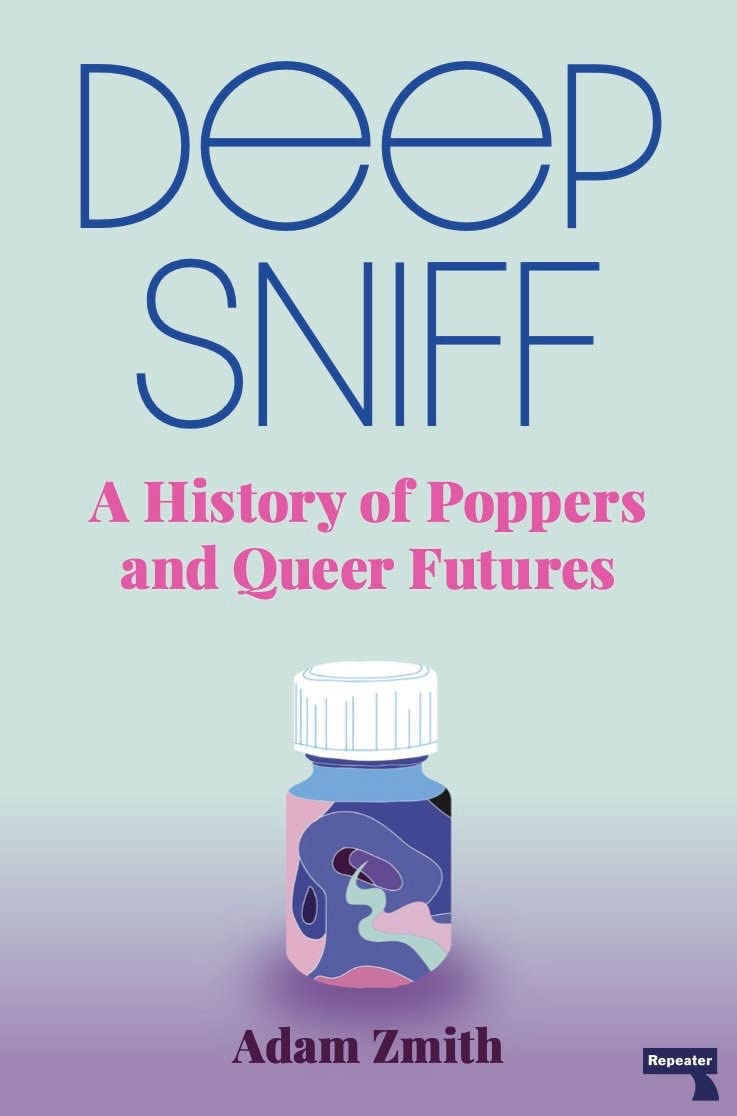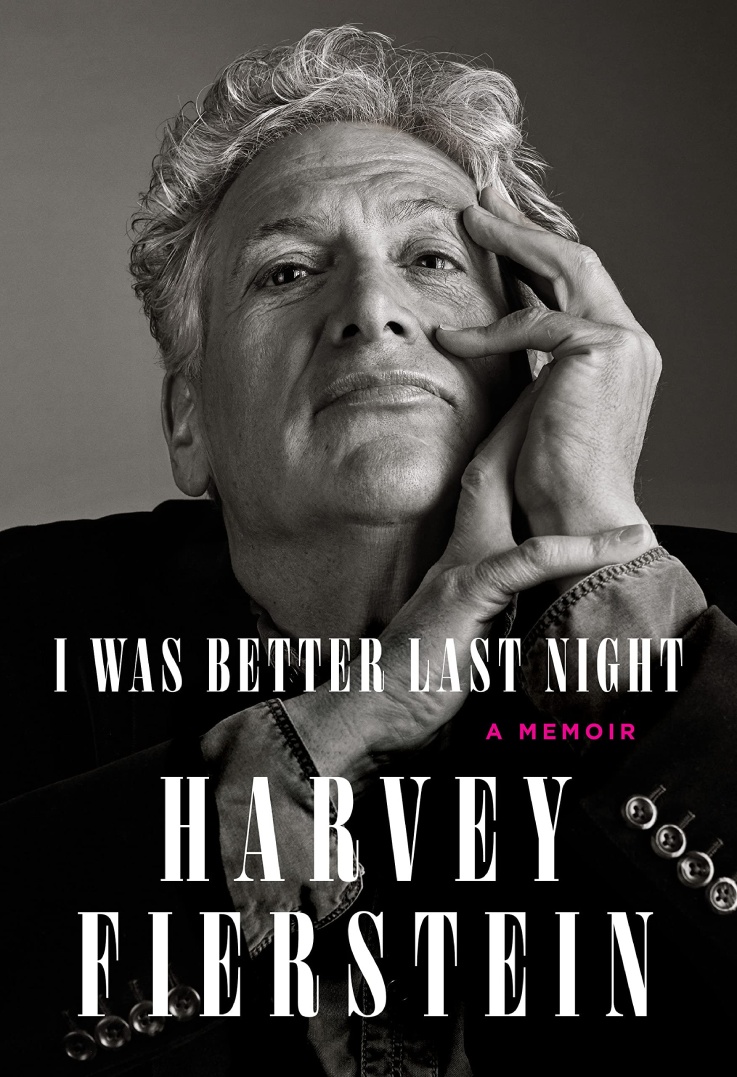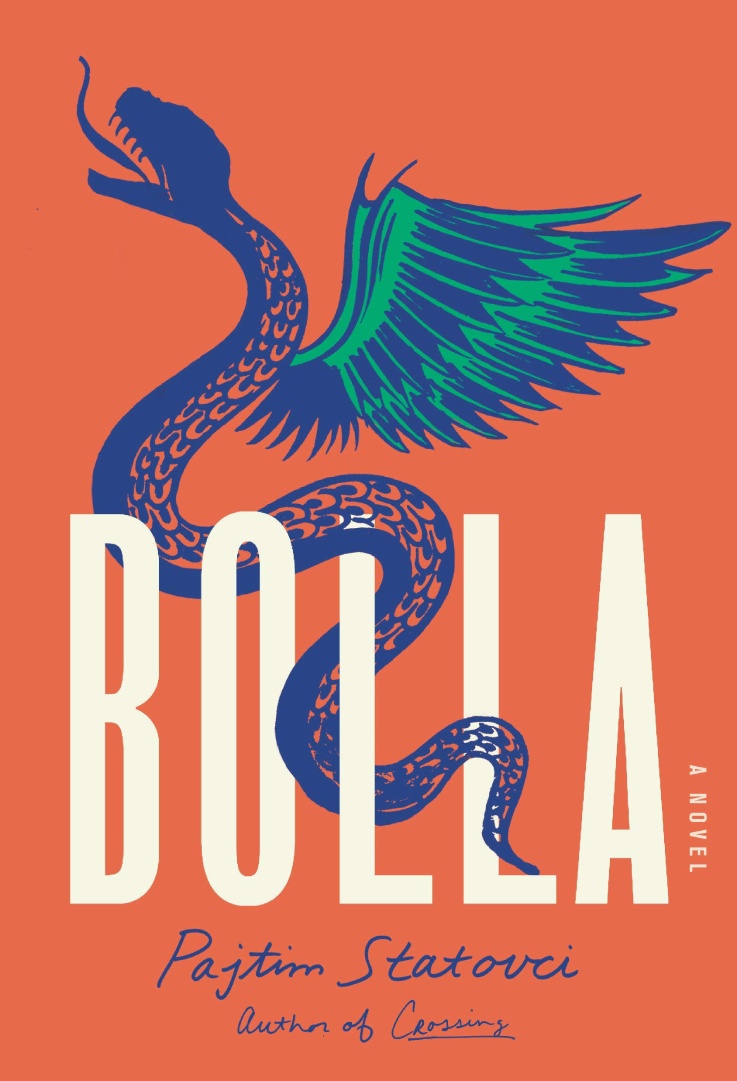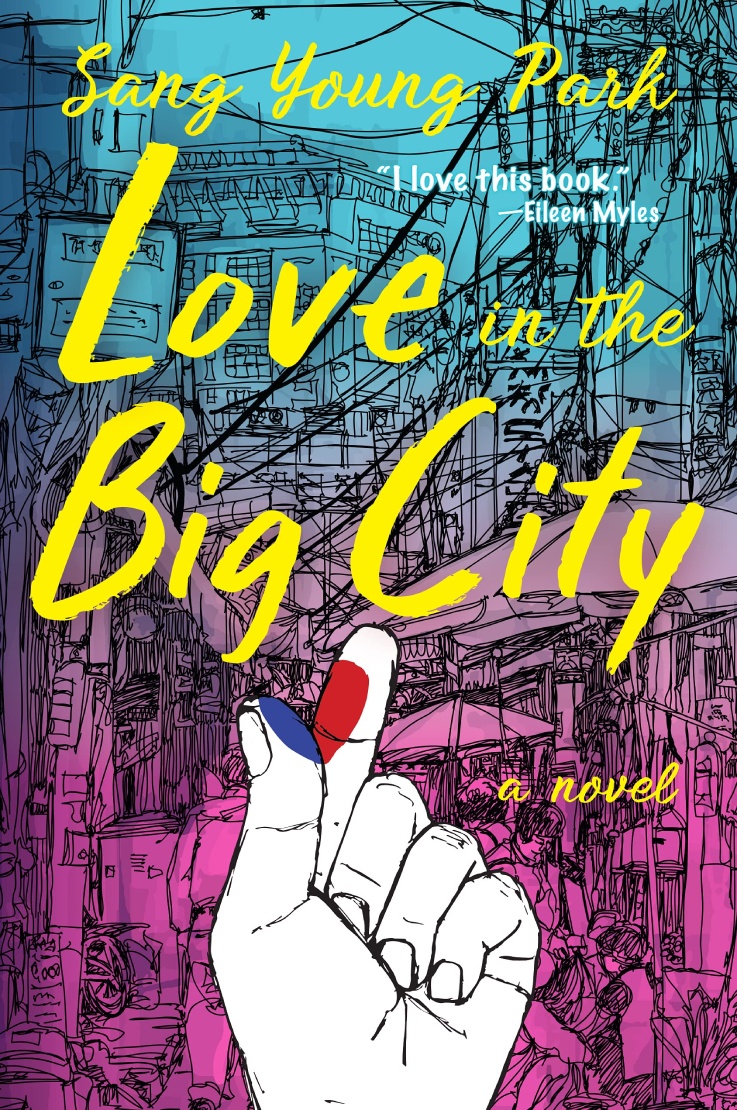
Our Best Books take you on a culinary biography of James Beard, The Man Who Ate Too Much to a head rush in Deep Sniff: A History of Poppers and Queer Futures, an utterly unexpected history of the bottled brews originally sold at British pharmacies in the late 1800s; Harvey Fierstein’s ebullient memoir I Was Better Last Night shares both the joys and humiliations he’s experienced as a gay trailblazer on Broadway and in Hollywood to Love In The Big City, a zesty whirlwind tour of gay life in Seoul, Korea.
 Appetites both culinary and carnal are thoroughly explored in John Birdsall’s definitive, elegantly written biography of James Beard, The Man Who Ate Too Much (W.W. Norton. $20. www.john-birdsall.com), now available in paperback. Before he became known as the father of farm-to-table cuisine, Beard (1903-1985) was the gay son of a lesbian mother. From an early age, he learned that while some sources of pleasure could be indulged in publicly, others were best repressed in pursuit of success. Born and raised in Portland, Oregon where he eventually attended Reed College, from which he was expelled for an “act of oral indecency” with a professor, Beard made his way to London and New York. After unsuccessfully trying his hand as a stage actor, he slipped sideways into the gastronomic world, catering private cocktail parties in the homes of New York’s painstakingly discrete gay arts elites, a steppingstone toward his first formal catering company, which was followed by cookbooks and a prestigious culinary school. By the late 1940s, he was hosting NBC’s I Love To Eat, the world’s first television cooking show. At a time when French cuisine was considered the epitome of fine dining in the U.S., Beard was an early advocate of homegrown American ingredients and unfussy technique. But even in the limelight, Beard hid away his sexuality, playing the jolly, sexless fat man for the mainstream audiences who sought his expertise. Birdsall, himself a gay man and former chef, writes beautifully and empathetically about Beard, capturing his consummate people-skills and entrepreneurial savvy as well as the undercurrent of repression that both fueled his success and dampened his enjoyment of it.
Appetites both culinary and carnal are thoroughly explored in John Birdsall’s definitive, elegantly written biography of James Beard, The Man Who Ate Too Much (W.W. Norton. $20. www.john-birdsall.com), now available in paperback. Before he became known as the father of farm-to-table cuisine, Beard (1903-1985) was the gay son of a lesbian mother. From an early age, he learned that while some sources of pleasure could be indulged in publicly, others were best repressed in pursuit of success. Born and raised in Portland, Oregon where he eventually attended Reed College, from which he was expelled for an “act of oral indecency” with a professor, Beard made his way to London and New York. After unsuccessfully trying his hand as a stage actor, he slipped sideways into the gastronomic world, catering private cocktail parties in the homes of New York’s painstakingly discrete gay arts elites, a steppingstone toward his first formal catering company, which was followed by cookbooks and a prestigious culinary school. By the late 1940s, he was hosting NBC’s I Love To Eat, the world’s first television cooking show. At a time when French cuisine was considered the epitome of fine dining in the U.S., Beard was an early advocate of homegrown American ingredients and unfussy technique. But even in the limelight, Beard hid away his sexuality, playing the jolly, sexless fat man for the mainstream audiences who sought his expertise. Birdsall, himself a gay man and former chef, writes beautifully and empathetically about Beard, capturing his consummate people-skills and entrepreneurial savvy as well as the undercurrent of repression that both fueled his success and dampened his enjoyment of it.
BUY BOOK When you purchase a book from our curated Bookshop.org shop we earn an affiliate commission. The books are independently reviewed by our book editor and the potential commission does not influence the review in any way.

Adam Zmith’s Deep Sniff: A History of Poppers and Queer Futures
Are you ready for a head rush? Well stick your nose in a book; specifically Adam Zmith’s Deep Sniff: A History of Poppers and Queer Futures (Repeater Books. $14.95. www.adamzmith.com), an utterly unexpected history of the bottled brews originally sold at British pharmacies in the late 1800s as a legitimate treatment for ailments ranging from angina to seasickness. According to Zmith, recreational use of the over-the-counter concoction took hold beginning in the 1930s and first peaked when GIs who discovered poppers in Vietnam brought them back to the U.S. and Britain. In 1969, the U.S. FDA made amyl nitrate a prescription-only medication, but in the mid-1970s a slightly reformulated version—isobutyl nitrite—made its way onto the shelves of record shops, head shops and porn shops and into the atmosphere at gay dance clubs, where it was literally pumped into rooms to induce a collective euphoria. Generations later poppers fueled the gay rave scene and once again caught on among straight partiers as well. Much more than mere history, Zmith offers readers a kaleidoscopic personal take on the symbolic meanings of poppers, full of fascinating observances about sex, stigma, and social change.
BUY BOOK When you purchase a book from our curated Bookshop.org shop we earn an affiliate commission. The books are independently reviewed by our book editor and the potential commission does not influence the review in any way.

Harvey Fierstein I Was Better Last Night
In Harvey Fierstein’s ebullient memoir I Was Better Last Night (Random House Audio. $22.50; print version, Knopf, $30. www.harveyfierstein.com), Fierstein’s famously gravelly voice brings a remarkable intimacy to the recorded version of the playwright and actor’s highly personal look back at his life, from early days as a hanger-on to Andy Warhol’s Factory crowd, to his breakthrough success with Torch Song Trilogy, one of the first commercial entertainments to treat drag queens as something other than a joke, through his prolific career as a librettist for musicals from La Cage Aux Folles to Kinky Boots. Fierstein shares both the joys and humiliations he’s experienced as a gay trailblazer on Broadway and in Hollywood. To hear these stories told in his own inimitable voice makes them all the more memorable. While a delight on paper, this may prove to be the best audiobook of the year.
BUY BOOK When you purchase a book from our curated Bookshop.org shop we earn an affiliate commission. The books are independently reviewed by our book editor and the potential commission does not influence the review in any way.

Bolla By Pajtim Statovci
Bolla (Pantheon. $26. www.patjimstatovci.wordpress.com) is harrowing, heartbreaking, and unblinkingly insightful. The third novel by 32-year old Patjim Statovci, who was born in Kosovo but has lived in Finland since age 2, begins with glimmers of self-realization and romance but quickly spins into darker, dangerous places. It’s 1995 in the Kosovan town of Pristina when Arsim, a 24-year-old aspiring writer, meets Milos, a medical student, in a café. The two fall headlong into an affair. At first, time spent holed up together in Milos small apartment feels like having a private country of their own, at once peaceful and passionate, but Arsim is a Muslim Albanian, Milos a Serb. The ethnic cleansing of the Balkan Wars is about to begin, sending Milos to the battlefront as a medic and Arsim to live as a hand-to-mouth refugee in an unnamed European city. War on the world stage is matched by the turmoil in Arsim’s psyche. Not only does he have a unquestioningly loyal wife, but within days of meeting Milos, she announces she is pregnant. The book quickly moves into alternating passages that follow each of the men’s paths over the subsequent decade until an eventual melancholy reunion. Remarkably, Statovci makes Arsim’s self-loathing feel at least as punishing as the senseless violence witnessed by Milos.
BUY BOOK When you purchase a book from our curated Bookshop.org shop we earn an affiliate commission. The books are independently reviewed by our book editor and the potential commission does not influence the review in any way.
AIRPLANE READ OF THE MONTH

Love In the Big City by Sang Young Park
Love In The Big City offers a zesty whirlwind tour of gay life in Seoul, Korea (Grove Press. $26. www.groveatlantic.com). Author Sang Young Park’s puckish attitude and lively prose (Vividly translated by Anton Hur) animate four linked stories in which Park’s semi-autobiographical first-person narrator, Young, moves from college life through his early thirties. The title character of “Jaehee” is Young’s hard-partying university gal pal, and the first straight person who he comes out to. The two share a studio apartment and entertain each other with critiques of the men with whom they spend a seemingly endless flurry of one night stands. “I would do anything I was told by whoever would buy me a drink,” notes Young flippantly. Park underscores the parallels between sex-positive women and gay men in still-conservative Korean society. For both, expressing one’s sexuality is a form of rebellion, still tinged with a bit of shame, but while Jaehee is ultimately able to settle into a culturally approved marriage, Young is left floating in a society that doesn’t officially recognize the existence of homosexual relationships while secretly catering to gay men’s most superficial pleasures in a vibrant, tucked-away nightlife scene. The book’s middle sections find Young in a series of ultimately unsatisfying romances, including an affair with a deeply closeted man 12 years his senior. There are deftly sketched portraits of Young’s deeply Christian mother, who he cares for through a serious health crisis, and a female friend who seeks an abortion. Even in such dire scenarios, Park’s writing is shot through with humor. When Young is diagnosed with HIV, he insists on referring to the virus by the pet-name Kylie (as in Minogue). The book’s bittersweet closing section is named “Gyu-ho” after the young bartender with whom Young finally finds a lasting relationship, despite the pair’s sero-discordancy. This book is among the most beautifully rendered love stories in contemporary queer fiction.
BUY BOOK When you purchase a book from our curated Bookshop.org shop we earn an affiliate commission. The books are independently reviewed by our book editor and the potential commission does not influence the review in any way.
Hot Type for Savvy Travelers — The Best Books For February 2022
The post Hot Type for Savvy Travelers — The Best Books For June 2022 appeared first on Passport Magazine.
Hot Type for Savvy Travelers — The Best Books For June 2022
Our Best Books take you on a culinary biography of James Beard, The Man Who Ate Too Much to a head rush in Deep Sniff: A History of Poppers and Queer Futures, an utterly unexpected history of the bottled brews originally sold at British pharmacies in the late 1800s; Harvey Fierstein’s ebullient memoir I Was Better Last Night shares both the joys and humiliations he’s experienced as a gay trailblazer on Broadway and in Hollywood to Love In The Big City, a zesty whirlwind tour of gay life in Seoul, Korea.
 Appetites both culinary and carnal are thoroughly explored in John Birdsall’s definitive, elegantly written biography of James Beard, The Man Who Ate Too Much (W.W. Norton. $20. www.john-birdsall.com), now available in paperback. Before he became known as the father of farm-to-table cuisine, Beard (1903-1985) was the gay son of a lesbian mother. From an early age, he learned that while some sources of pleasure could be indulged in publicly, others were best repressed in pursuit of success. Born and raised in Portland, Oregon where he eventually attended Reed College, from which he was expelled for an “act of oral indecency” with a professor, Beard made his way to London and New York. After unsuccessfully trying his hand as a stage actor, he slipped sideways into the gastronomic world, catering private cocktail parties in the homes of New York’s painstakingly discrete gay arts elites, a steppingstone toward his first formal catering company, which was followed by cookbooks and a prestigious culinary school. By the late 1940s, he was hosting NBC’s I Love To Eat, the world’s first television cooking show. At a time when French cuisine was considered the epitome of fine dining in the U.S., Beard was an early advocate of homegrown American ingredients and unfussy technique. But even in the limelight, Beard hid away his sexuality, playing the jolly, sexless fat man for the mainstream audiences who sought his expertise. Birdsall, himself a gay man and former chef, writes beautifully and empathetically about Beard, capturing his consummate people-skills and entrepreneurial savvy as well as the undercurrent of repression that both fueled his success and dampened his enjoyment of it.
Appetites both culinary and carnal are thoroughly explored in John Birdsall’s definitive, elegantly written biography of James Beard, The Man Who Ate Too Much (W.W. Norton. $20. www.john-birdsall.com), now available in paperback. Before he became known as the father of farm-to-table cuisine, Beard (1903-1985) was the gay son of a lesbian mother. From an early age, he learned that while some sources of pleasure could be indulged in publicly, others were best repressed in pursuit of success. Born and raised in Portland, Oregon where he eventually attended Reed College, from which he was expelled for an “act of oral indecency” with a professor, Beard made his way to London and New York. After unsuccessfully trying his hand as a stage actor, he slipped sideways into the gastronomic world, catering private cocktail parties in the homes of New York’s painstakingly discrete gay arts elites, a steppingstone toward his first formal catering company, which was followed by cookbooks and a prestigious culinary school. By the late 1940s, he was hosting NBC’s I Love To Eat, the world’s first television cooking show. At a time when French cuisine was considered the epitome of fine dining in the U.S., Beard was an early advocate of homegrown American ingredients and unfussy technique. But even in the limelight, Beard hid away his sexuality, playing the jolly, sexless fat man for the mainstream audiences who sought his expertise. Birdsall, himself a gay man and former chef, writes beautifully and empathetically about Beard, capturing his consummate people-skills and entrepreneurial savvy as well as the undercurrent of repression that both fueled his success and dampened his enjoyment of it.
BUY BOOK When you purchase a book from our curated Bookshop.org shop we earn an affiliate commission. The books are independently reviewed by our book editor and the potential commission does not influence the review in any way.

Adam Zmith’s Deep Sniff: A History of Poppers and Queer Futures
Are you ready for a head rush? Well stick your nose in a book; specifically Adam Zmith’s Deep Sniff: A History of Poppers and Queer Futures (Repeater Books. $14.95. www.adamzmith.com), an utterly unexpected history of the bottled brews originally sold at British pharmacies in the late 1800s as a legitimate treatment for ailments ranging from angina to seasickness. According to Zmith, recreational use of the over-the-counter concoction took hold beginning in the 1930s and first peaked when GIs who discovered poppers in Vietnam brought them back to the U.S. and Britain. In 1969, the U.S. FDA made amyl nitrate a prescription-only medication, but in the mid-1970s a slightly reformulated version—isobutyl nitrite—made its way onto the shelves of record shops, head shops and porn shops and into the atmosphere at gay dance clubs, where it was literally pumped into rooms to induce a collective euphoria. Generations later poppers fueled the gay rave scene and once again caught on among straight partiers as well. Much more than mere history, Zmith offers readers a kaleidoscopic personal take on the symbolic meanings of poppers, full of fascinating observances about sex, stigma, and social change.
BUY BOOK When you purchase a book from our curated Bookshop.org shop we earn an affiliate commission. The books are independently reviewed by our book editor and the potential commission does not influence the review in any way.

Harvey Fierstein I Was Better Last Night
In Harvey Fierstein’s ebullient memoir I Was Better Last Night (Random House Audio. $22.50; print version, Knopf, $30. www.harveyfierstein.com), Fierstein’s famously gravelly voice brings a remarkable intimacy to the recorded version of the playwright and actor’s highly personal look back at his life, from early days as a hanger-on to Andy Warhol’s Factory crowd, to his breakthrough success with Torch Song Trilogy, one of the first commercial entertainments to treat drag queens as something other than a joke, through his prolific career as a librettist for musicals from La Cage Aux Folles to Kinky Boots. Fierstein shares both the joys and humiliations he’s experienced as a gay trailblazer on Broadway and in Hollywood. To hear these stories told in his own inimitable voice makes them all the more memorable. While a delight on paper, this may prove to be the best audiobook of the year.
BUY BOOK When you purchase a book from our curated Bookshop.org shop we earn an affiliate commission. The books are independently reviewed by our book editor and the potential commission does not influence the review in any way.

Bolla By Pajtim Statovci
Bolla (Pantheon. $26. www.patjimstatovci.wordpress.com) is harrowing, heartbreaking, and unblinkingly insightful. The third novel by 32-year old Patjim Statovci, who was born in Kosovo but has lived in Finland since age 2, begins with glimmers of self-realization and romance but quickly spins into darker, dangerous places. It’s 1995 in the Kosovan town of Pristina when Arsim, a 24-year-old aspiring writer, meets Milos, a medical student, in a café. The two fall headlong into an affair. At first, time spent holed up together in Milos small apartment feels like having a private country of their own, at once peaceful and passionate, but Arsim is a Muslim Albanian, Milos a Serb. The ethnic cleansing of the Balkan Wars is about to begin, sending Milos to the battlefront as a medic and Arsim to live as a hand-to-mouth refugee in an unnamed European city. War on the world stage is matched by the turmoil in Arsim’s psyche. Not only does he have a unquestioningly loyal wife, but within days of meeting Milos, she announces she is pregnant. The book quickly moves into alternating passages that follow each of the men’s paths over the subsequent decade until an eventual melancholy reunion. Remarkably, Statovci makes Arsim’s self-loathing feel at least as punishing as the senseless violence witnessed by Milos.
BUY BOOK When you purchase a book from our curated Bookshop.org shop we earn an affiliate commission. The books are independently reviewed by our book editor and the potential commission does not influence the review in any way.
AIRPLANE READ OF THE MONTH

Love In the Big City by Sang Young Park
Love In The Big City offers a zesty whirlwind tour of gay life in Seoul, Korea (Grove Press. $26. www.groveatlantic.com). Author Sang Young Park’s puckish attitude and lively prose (Vividly translated by Anton Hur) animate four linked stories in which Park’s semi-autobiographical first-person narrator, Young, moves from college life through his early thirties. The title character of “Jaehee” is Young’s hard-partying university gal pal, and the first straight person who he comes out to. The two share a studio apartment and entertain each other with critiques of the men with whom they spend a seemingly endless flurry of one night stands. “I would do anything I was told by whoever would buy me a drink,” notes Young flippantly. Park underscores the parallels between sex-positive women and gay men in still-conservative Korean society. For both, expressing one’s sexuality is a form of rebellion, still tinged with a bit of shame, but while Jaehee is ultimately able to settle into a culturally approved marriage, Young is left floating in a society that doesn’t officially recognize the existence of homosexual relationships while secretly catering to gay men’s most superficial pleasures in a vibrant, tucked-away nightlife scene. The book’s middle sections find Young in a series of ultimately unsatisfying romances, including an affair with a deeply closeted man 12 years his senior. There are deftly sketched portraits of Young’s deeply Christian mother, who he cares for through a serious health crisis, and a female friend who seeks an abortion. Even in such dire scenarios, Park’s writing is shot through with humor. When Young is diagnosed with HIV, he insists on referring to the virus by the pet-name Kylie (as in Minogue). The book’s bittersweet closing section is named “Gyu-ho” after the young bartender with whom Young finally finds a lasting relationship, despite the pair’s sero-discordancy. This book is among the most beautifully rendered love stories in contemporary queer fiction.
BUY BOOK When you purchase a book from our curated Bookshop.org shop we earn an affiliate commission. The books are independently reviewed by our book editor and the potential commission does not influence the review in any way.
Hot Type for Savvy Travelers — The Best Books For February 2022
The post Hot Type for Savvy Travelers — The Best Books For June 2022 appeared first on Passport Magazine.


Post a Comment